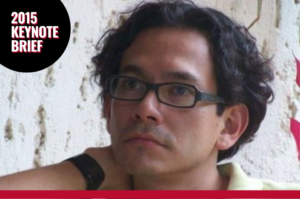By Elizabeth Best
 José Carlos León Vargas believes in the power of community. In 2009, Vargas had a revelation about changing the meager lives of the poorest of the poor in Brazil and Southern Mexico. He realized that people living in slums, and or subsisting on the edge of giant trash dumps, could transform their own lives if they learned to grow their own food and construct houses and schools from scavenged material.
José Carlos León Vargas believes in the power of community. In 2009, Vargas had a revelation about changing the meager lives of the poorest of the poor in Brazil and Southern Mexico. He realized that people living in slums, and or subsisting on the edge of giant trash dumps, could transform their own lives if they learned to grow their own food and construct houses and schools from scavenged material.
Today he is the director of SiKanda, a nonprofit group he co-founded in 2009 with his wife. The name means “transformation,” or “change” in Mixtec, and that is what the organization strives to do in one impoverished community after another in the province of Oaxaca, Mexico.
In his keynote address, Vargas, encouraged a “bottom up” approach to helping others and working with charitable organizations. He emphasized how crucial it is to engage those who need help and educate them about using existing resources in totally new ways.
He also encouraged public health workers to focus one community at a time to have the biggest impact. His organization has helped more than 7,000 people in 12 locations in Oaxaca – but not all at once.
As a case study for his talk, Vargas focused on a group of people living on the edge of a landfill. Sixty-five percent of the adults are women, because most of the men have migrated north to find work. They lived in flimsy lean-tos and earned $2 to $3 per day. He described teaching the people how to use earthworms to turn garbage into compost, which they sold for money and used to grow their own vegetables.
earning to produce their own food helped the community members have a more economically sustainable lifestyle and to eat healthier diets. Sikanda makes healthy eating a priority in their programs because 10 percent of Mexico’s population suffers from diabetes.
SiKanda raised $400 from donors and set out help local people build small, sturdy houses for their families. Working from a plan developed for the project, Vargas bought some materials and helped fabricate construction materials from recycled materials found in the landfill. These houses protected families from potential illness and poor weather conditions.
People in the community want education for their children, and SiKanda recently built a one-room school building and stocked it with books and furniture.
Vargas is now trying to raise social awareness about communities such as the one by the landfill. Privileged Oaxaca residents know Paris or London better than the outskirts of their own city, he said. So he is bringing them to look at some of SiKanda’s projects, hoping to build support.
